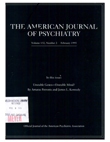The reliability of three definitions of bizarre delusions
Abstract
OBJECTIVE: This study was conducted to determine whether the interjudge reliability of the DSM-III-R concept of bizarre delusions could be improved by alternative definitions of the concept. METHOD: Twelve raters evaluated 180 delusions of separate psychiatric patients according to the DSM-III-R and two alternative definitions of bizarre delusions. RESULTS: The kappas for the DSM-III-R definition and for one of the alternative definitions were 0.64 and 0.65, respectively; for the other alternative definition it was 0.45. All three definitions were highly intercorrelated, largely identifying the same cases. CONCLUSIONS: Neither of the alternative definitions of bizarre delusions was more reliable than the DSM-III-R definition. The reliability of the DSM-III-R definition, although only fair, is comparable to that of other important clinical concepts that play a major role in the DSM-III-R diagnostic criteria for psychotic disorders.
Access content
To read the fulltext, please use one of the options below to sign in or purchase access.- Personal login
- Institutional Login
- Sign in via OpenAthens
- Register for access
-
Please login/register if you wish to pair your device and check access availability.
Not a subscriber?
PsychiatryOnline subscription options offer access to the DSM-5 library, books, journals, CME, and patient resources. This all-in-one virtual library provides psychiatrists and mental health professionals with key resources for diagnosis, treatment, research, and professional development.
Need more help? PsychiatryOnline Customer Service may be reached by emailing [email protected] or by calling 800-368-5777 (in the U.S.) or 703-907-7322 (outside the U.S.).



